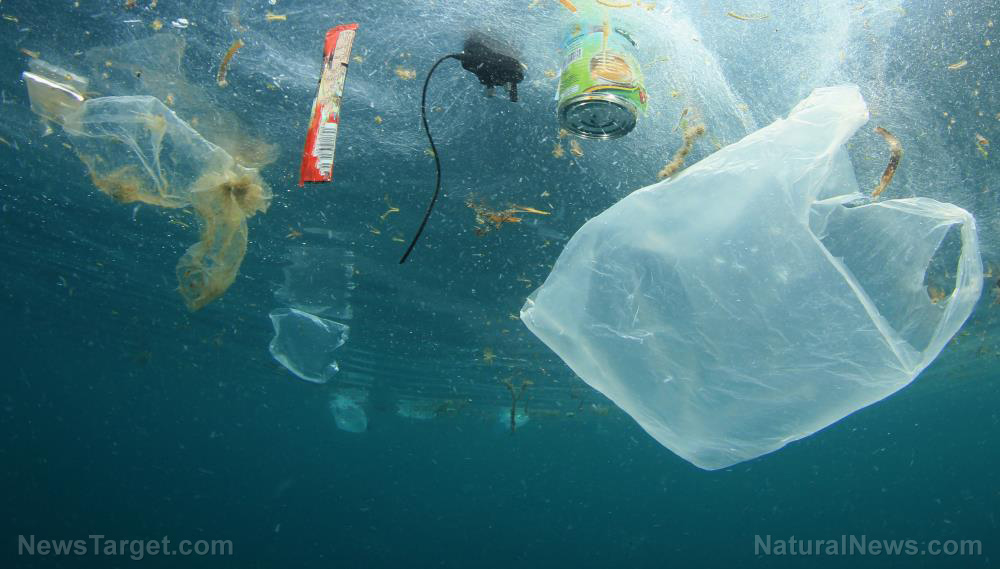Follow these tips to reduce plastic pollution
04/23/2019 / By Ralph Flores

It’s official: We’re heading toward a “plastic world” – and we’re not talking about credit cards.
Plastic – the ubiquitous polymer found in nearly all consumer products – is part of just about every aspect of our lives. For the most part, it’s a versatile material that has been part of many significant innovations, such as in construction, electronics, packaging, and even automotive design, but it also has its drawbacks.
Since it was first invented, people have relied heavily on plastics. A report presented in the World Economic Forum in 2016 revealed that people have produced over 311 million metric tons of plastic in 2014 – a twenty-fold increase from 50 years ago. These numbers aren’t going down anytime soon, though, as researchers believe that annual plastic production will triple by 2050.
This over-dependence on plastic, unfortunately, has brought a problem of global proportions: plastic pollution.
More than eight million metric tons of plastic debris find its way into oceans every year. At this rate, researchers estimate that in less than three decades’ time, there will be more plastic than fish in our oceans.
Out of sight, out of mind
An earlier report released by the U.K. government called for a more active stance in dealing with the current state of plastic pollution in the sea, particularly addressing the “out of sight, out of mind” mentality that people have when it comes to these issues.
“High levels of plastic pollution can affect health and wellbeing in several ways,” the researchers wrote in the report. People who are exposed to coastal plastic litter, for instance, are likely at risk of bacterial infections such as E. coli.

“Given the significant threat posed by increased marine litter, initiatives to increase public awareness of the sea, and the threats it faces, should be supported,” they added.
While it could potentially have adverse effects for humans, marine wildlife have mainly borne the brunt of persistent plastic pollution. A quick search on the internet will reveal heartbreaking stories – from a whale that washed up in the Philippines with nearly 90 pounds of plastic bags in its stomach to that video of a sea turtle with a 12-centimeter plastic straw stuck up its nose.
To make it worse, plastic pollution is already seen in areas other than the ocean. A study in Nature Geoscience reveals that microplastics, tiny pieces that come from larger items as they degrade in nature, are present even in areas that are considered to be remote. In the study, the researchers found that plastic pollution can now be distributed using atmospheric transport, making it possible for microplastics to pollute even the pristine Pyrenees mountains in France.
What you do makes a huge difference
Our problem with plastic pollution can feel overwhelming, especially since we’re on a race to save the planet. However, doing your part in reducing plastic pollution can go a long way. Here are just some ways to help. (h/t to Blogs.EI.Columbia.edu)
- Start with your own plastic use. A lot of people are unwitting contributors to overall plastic pollution, especially when they use single-use plastics like dry-cleaning bags, plastic bags, and straws. In particular, cigarette butts with plastic filters, food wrappers, and plastic bottles were the top three trash items collected from beaches and waterways, according to non-profit environmental group Ocean Conservancy.
- Shop responsibly, especially when it comes to clothes. Synthetic textiles like polyester, lycra, and nylon account for over 35 percent of all microplastics in the ocean. Washing these fibers releases anywhere between 600,000 to 17.7 million microfibers, which can end up in the wastewater. If you need to shop for clothes, go for natural fibers like cotton, hemp, and wool.
- Recycle, donate, repair. Among the seven types of plastic produced worldwide, only two of them can be recycled – those with resin code #1 (usually soda, water, and cooking oil bottles) and #2 (milk and juice jugs, as well as shampoo bottles and laundry detergent). To know which recycling programs are in effect in your area, check with your local government. If you’re recycling plastic, however, make sure that it’s clean – dirt and food waste can contaminate a whole bale of plastic.
- Be active in your community. Participate in cleanup efforts in your community – or start your own. There are different ways to spread awareness about the plight of our oceans.
It might seem that our efforts in preventing plastic pollution do little to stop it – after all, it’s a problem that has already spread to the deepest parts of the sea – but if it means that we can enjoy the bounties of the sea a little longer, what’s a step in the right direction but an investment to the planet’s (and our) future.
Sources include:
WEForum.org [PDF]
Assets.Publishing.Service.gov.uk
Submit a correction >>
Tagged Under:
This article may contain statements that reflect the opinion of the author





















